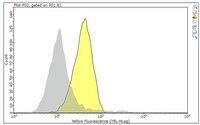MABC1127-25UL Sigma-AldrichAnti-FGFR-4 Antibody, clone 29.2
Anti-FGFR-4, clone 29.2, Cat. No. MABC1127, is a rabbit monoclonal antibody that detects Fibroblast growth factor receptor 4 and has been tested for use in Flow Cytometry.
More>> Anti-FGFR-4, clone 29.2, Cat. No. MABC1127, is a rabbit monoclonal antibody that detects Fibroblast growth factor receptor 4 and has been tested for use in Flow Cytometry. Less<<Recommended Products
Overview
| Replacement Information |
|---|
Key Spec Table
| Species Reactivity | Key Applications | Host | Format | Antibody Type |
|---|---|---|---|---|
| H | FC | Rb | Culture Supernatant | Monoclonal Antibody |
| References |
|---|
| Product Information | |
|---|---|
| Format | Culture Supernatant |
| Presentation | Rabbit monoclonal antibody in supernatant without preservatives. |
| Physicochemical Information |
|---|
| Dimensions |
|---|
| Materials Information |
|---|
| Toxicological Information |
|---|
| Safety Information according to GHS |
|---|
| Safety Information |
|---|
| Packaging Information | |
|---|---|
| Material Size | 25 µL |
| Transport Information |
|---|
| Supplemental Information |
|---|
| Specifications |
|---|
| Global Trade Item Number | |
|---|---|
| Catalogue Number | GTIN |
| MABC1127-25UL | 04054839550904 |
Documentation
Anti-FGFR-4 Antibody, clone 29.2 SDS
| Title |
|---|
Anti-FGFR-4 Antibody, clone 29.2 Certificates of Analysis
| Title | Lot Number |
|---|---|
| Anti-FGFR-4, clone 29.2 Monoclonal Antibody | 3096910 |
















